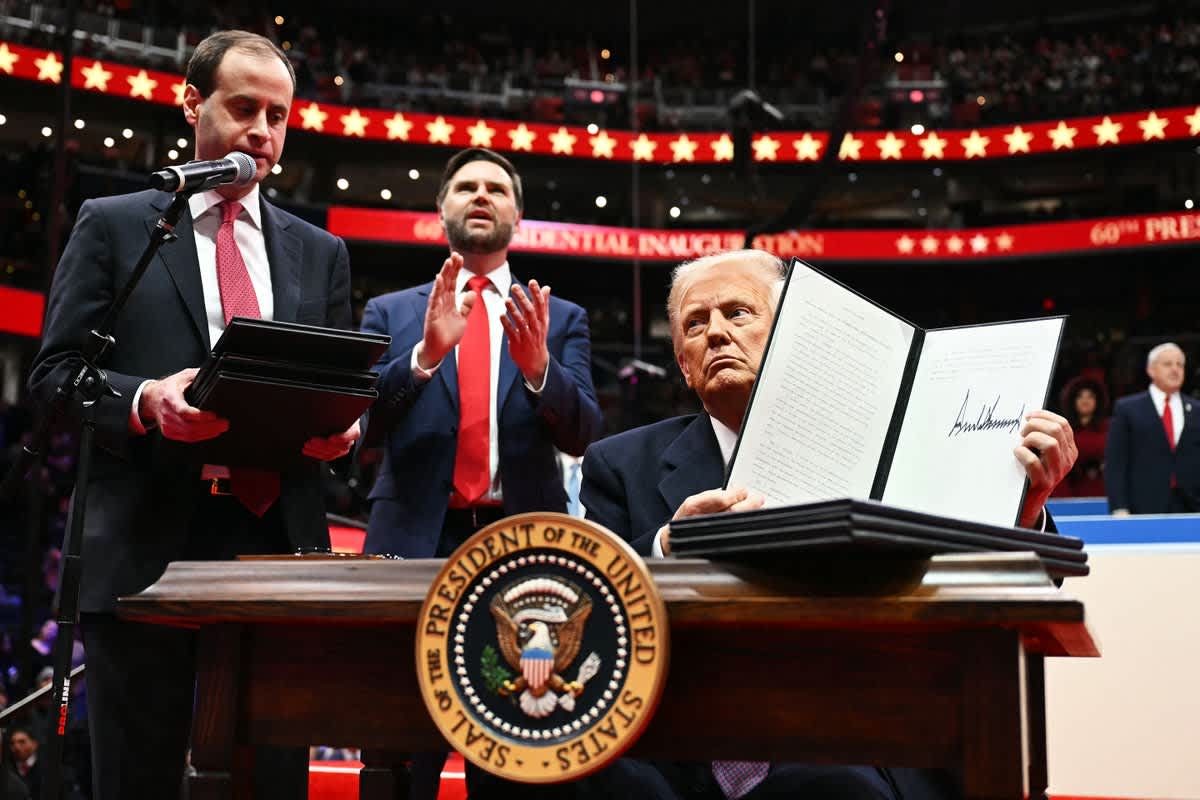What Trump’s First Days Say about Science in the New Administration
US President Donald Trump holds an executive order announcing the US withdrawal from the Paris Agreement, he just signed during the inaugural parade inside Capital One Arena, in Washington, DC, on January 20, 2025.
Almost lost in the recent maelstrom of President Donald Trump’s frenetic norm-breaking conduct is an ominous forecast for science. Just days have passed since Trump returned to the Oval Office, but his executive orders and nominations provide early clues about how the second Trump administration could shatter the remarkable science and technology engine that has driven the American economy for more than three quarters of a century.
On the campaign trail, Trump promised to slash federal spending, fire agency experts he deemed “rogue” and take a sledgehammer to fact-based policies that didn’t suit his whims. With the assistance of his Capitol Hill allies, including House Speaker Mike Johnson, and his mega financial campaign backer Elon Musk, head of the newly created advisory group known as DOGE (Department of Government Efficiency), he is beginning to deliver on his pledges.
Trump’s nominees for many high-level administrative posts bear ample testimony to his disdain for science. Robert F. Kennedy, Jr., whom he has tapped to lead the Department of Health and Human Services, is perhaps the most obvious case. A lawyer by training and an antivaccine peddler and conspiracy theorist by reputation, he would have authority over the direction of the National Institutes of Health, the nation’s biomedical research gem with a budget of almost $50 billion a year.
If you’re enjoying this article, consider supporting our award-winning journalism by subscribing. By purchasing a subscription you are helping to ensure the future of impactful stories about the discoveries and ideas shaping our world today.
But he’s not the only one. Chris Wright, a fracking executive and Trump’s choice for energy secretary, is not an outright climate change denier, but he’s skeptical of the scientific consensus that a hotter planet is causing more frequent extreme weather events. While he acknowledges the impact of carbon emissions on global warming, he continues to promote increased production and use of fossil fuels. You’d have to twist yourself into a pretzel to reconcile those two viewpoints scientifically. Of course, he’s echoing the centerpiece of Trump’s energy policy: “Drill, baby, drill.”
These two appointments only serve to reinforce Trump’s own rejection of science. He’s falsely claimed that climate change is a hoax; he’s railed against windmills, calling them, without scientific evidence, whale killers; he’s blamed the recent Los Angeles wildfires on the closure of a valve on a water pipeline that doesn’t exist; and, in his first term, he promoted dangerous quack medicines to combat COVID. He’s said he wants clean air and clean water, but contrary to good science, he’s promoting a return to coal for producing electricity and is in the midst of hijacking California’s water management practices that carefully control salinity in the Sacramento–San Joaquin Delta.
You need only look at two executive actions with international ramifications to begin to grasp the scope of Trump’s war on science. On day one of his new administration, he announced America’s exit from both the Paris climate agreement and the World Health Organization. Science, which is international in character, simply doesn’t have a seat at Trump’s “America First” table.
A few of Trump’s prospective appointments and their credentials illustrate where he places an emphasis.
Emil Michael, who would serve as undersecretary of defense for research and engineering is a former Uber executive. He is a businessman with a legal education, not the accomplished engineering one typically found in a technical Pentagon role.
Leadership and policies matter, but the quality of the federal science workforce and federal science budgets are just as important. During his first week in office, Trump established a government-wide hiring freeze and took steps that would allow him to replace a class of federal workers with Trump loyalists, both threatening the continuity and freedom from overt political interference that science requires. On the funding side, science support is caught in a vise between Republican plans to reduce taxes and increase defense spending, while constraining the size of the federal debt. That’s the future. The present? All federal grants have just been suspended until grantees show that they don’t run afoul of Trump’s unilateral executive orders. (The grant suspension was then temporarily paused by a federal judge.)
Absent greater public awareness the ominous forecast will turn into inevitability.
This is an opinion and analysis article, and the views expressed by the authors are not necessarily those of Scientific American.
Michael S. Lubell is a professor of physics at the City College of the City University of New York (CUNY) and former director of public affairs of the American Physical Society. He is author of
Source: www.scientificamerican.com
